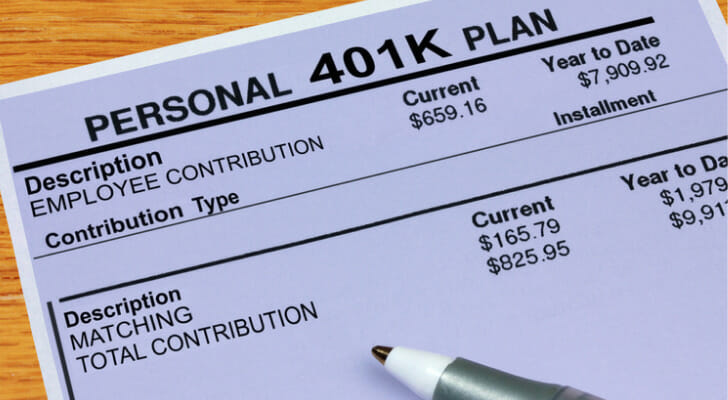For many people, debt is the biggest obstacle to saving for their retirement. In particular, millennials and Gen Z workers often have to choose between contributing to their 401(k)s or paying off tens of thousands in student loans. The time value of money makes it important to save for retirement early, and by the same token, the time value of money makes it important to pay off debt as fast as possible.
When should you prioritize paying off debt, and when should you put that money toward your 401(k), IRA and other retirement savings? We review the main schools of thought on this. For help navigating this particular predicament and determining which strategy is most appropriate for your financial plan, consider working with a financial advisor.
When In Doubt, Maximize Gains
For the paying off debt vs. saving for retirement conundrum, whether you avoid spending more on debt or capture greater gains on retirement you often end up in the same place. So, when in doubt, ask yourself which account will grow faster.
For example, say you owe $1,000 with an annual interest rate of 4% while the S&P 500 has an average annual return around 10%. You have $100 and intend to commit all of it. You can make three choices:
- $0 to debt, $0 to retirement, $100 in cash
Your debt grows to $104 after interest. Your retirement account is worth $0. You’re down $4 compared to your initial position.
- $100 to debt, $0 to retirement
Your debt is at $0. Your retirement account is at $0. You’re up $4 compared to a scenario where you had done nothing and kept that money in cash.
- $0 to debt, $100 to retirement
Your debt grows to $104 after interest. Your retirement savings grow to $110. You’ve lost $4 in net wealth due to the interest gains, but gained $10 in net wealth due to your retirement gains. You’re up $6 compared to had you done nothing and kept that money in cash.
In this example, you’re in a better position by choosing the maximum gain. The opposite would be true when your interest rate is higher than your potential market gains. In those cases you can lose money by investing rather than paying off debt. This isn’t always the right answer, but it’s a good rule of thumb.
Don’t Waste Matching Contributions

Matching contributions mean that for every dollar you put into your retirement account, your employer will contribute a dollar as well. If your employer offers this, it generally structures it around a percentage of income. For example, it might match your 401(k) contributions dollar-for-dollar up to 5% of your income. There aren’t many deals better than this. When possible, maximize a matching contribution plan. This literally doubles your investment, offering a 100% immediate return.
Pay Off Credit Cards
Credit cards are just about the definition of high-interest debt. Many cards can charge you an interest rate of 16% to 20% if you keep carrying the balance. There’s almost no retirement account you can find that will match that kind of growth.
This is an area of debt that’s worth focusing on, often even if it means contributing less to your retirement in a given month.
Defer Mortgages And Similarly Situated Debt
While credit cards are short-term, high-interest debt, other forms of lending have longer, better terms. The classic example is a 30-year mortgage. Keeping on top of long-term debt can help build your credit rating. In addition, as long as you have a fixed interest rate, inflation will erode the value of that debt. Even at 2% inflation (the Federal Reserve’s inflation target), over a 10-, 20- or 30-year period your debt will lose significant value relative to prevailing wages.
This makes long term debt a good, low-priority choice. There are good reasons to pay off debt as quickly as possible, certainly. If nothing else, interest adds up quite a bit over that many years. But if you have to choose, prioritize retirement relative to paying down long-term debt.
When Possible, Maximize a Roth Account
Here’s the thing about a Roth IRA or the less-common Roth 401(k): Their rate of return is effectively higher than the numbers suggest. Say you’re an individual with an IRA that grows from $100,000 to $250,000 over 10 years. This gives you an average annual gain of $15,000, or 15%. If you withdraw this money in 2023, you would pay taxes as follows on the $150,000 gains:
- 0% up to $41,676
- 15% on all gains between $41,677 and $150,000
This means you would pay 15% taxes on $108,324 (the $150,000 gains – the $41,676 at a 0% tax bracket), or $16,248. So your net gains are $133,752. This gives you an effective annual gain of 13.3% after taxes. If that had been a Roth IRA, you wouldn’t have paid those taxes. When you’re calculating the strongest return, a Roth IRA or Roth 401(k) will typically have an effective gain several points higher than a standard retirement account. Consider that when you compare the potential growth of debt vs. retirement.
The Bottom Line

Many people, especially those with student loans, have to decide between paying off debt and investing for retirement. You should often prioritize some forms of short-term debt, like a credit card, while you can make minimum payments on long-term debt, like a mortgage.
And when in doubt, prioritize the account that will grow fastest.
Tips for Retirement Savers
- Retirement is one question, while savings are another. When should you prioritize getting out of debt relative to saving money and building near-term wealth?
- Whether you want to pay off debt or save for retirement, the best approach is to make a plan. Finding a financial advisor doesn’t have to be hard. SmartAsset’s free tool matches you with up to three vetted financial advisors who serve your area, and you can interview your advisor matches at no cost to decide which one is right for you. If you’re ready to find an advisor who can help you achieve your financial goals, get started now.
Photo credit: ©iStock.com/Tinpixels, ©iStock.com/Garyphoto Goodboy ©iStock.com/Picture Company
